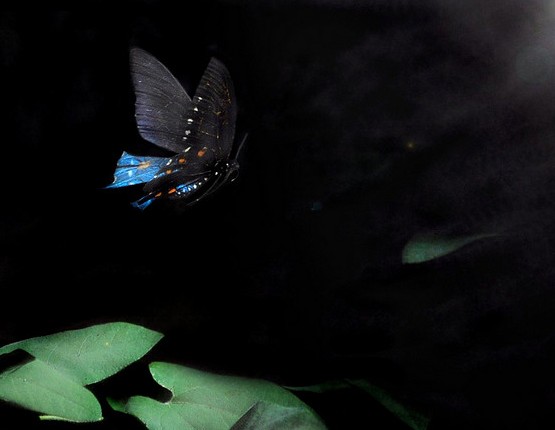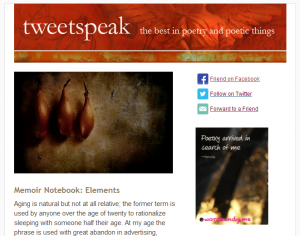I have a theory about poets and poetry, and it is this: there are only four poets in the United States who make a living by writing poetry. One of them is Billy Collins. I’m not sure who the other three are. But I know they must be out there. Somewhere.
At our recent poetry jam on Twitter, the very first prompt spoke to my theory: “You’ll never be able to make a living writing poems.” It’s a line from The Poetry Home Repair Manual: Practical Advice for Beginning Poets by Ted Kooser, former U.S. Poet Laureate and author of some wonderful collections of poetry. (And if you wonder if he is one of the other three poets making a living from writing poems, you should know he retired from an insurance company in Nebraska, where he spent most of his adult working life.)
But even if most of us can’t make a living from writing poems, we can still write for the sheer enjoyment and pleasure it brings, we can still find ourselves challenged and perplexed and awed and struck speechless by reading great poetry, and we can participate in Tweetspeak Poetry jams on Twitter, surprising our Twitter followers when they see tweets like “But if you dress the part, maybe poems will begin to live on your skin.”
Some 18 Twitter poets participated in the jam, and led by our intrepid prompter, away they did go. Here are the first five poems assembled from the jam. (And there are more to come.)
The Poetry Home Repair Manual
(Dedicated to Ted Kooser)
Birth of a poem: Dressing the part
You’ll never be able to make a living writing poems;
you’ll never be able to make a life if you don’t.
But if you dress the part,
poems will begin to live on your skin.
What part of the poem should I dress?
Tell a story in pictures:
begin with your eyes,
follow the line of the neck,
surrounded in pearls.
Black stockings for its long, lithe lines.
(Snag the stockings, they’ll run on forever.)
Just make sure to cover the midriff.
(Snag the run-on and your midriff will be forever striped.)
Red sneakers for its feet,
checkered laces tied twice,
cushioned soles for support,
a red ribbon for its teeth.
With the birth of a poem,
stretch lines around the midriff,
stripes upon the skin,
err, stretch marks. Whichever.
Stretch and stretch and stretch. Birth!
Red the color or birth,
stretch the mark of growth.
And a fedora for formality.
I love my fedora. Let’s go walking,
walking past the sunset into the never-end.
Take it down, yes,
to the end that never ends.
The poem tumbles down
Support my illusion, ma’am.
Support my laces. Tie me twice.
Bolster it with blindfolds, support itself is illusion.
The poem tumbles down my shoulder.
Illusion caught in red laces.
I don’t want you to have any
illusions: tattoos can scar like a heart
done in by soured words. A red poem
stretches around the moment of illusions.
Ah, the mystery of poetry
tied up in ribbons
laced with words
caught, and caught again.
We can stretch meaning,
take down a line or two.
The red sky at night tells
of poetry’s delight. Never ending,
stretched across the sky;
never-ending night unlaced,
silver ribbon delighted.
Take it down, that take unlacing.
Never-ending night unlaced,
never-ending night unlaced
The memoir
Put everything you want
to say in your memoir,
just make it six words
no more no less.
Let down your guard,
write what you mean,
say what you will.
A minimum of effort
is all it takes
to read your lips,
lips that don’t move,
lines that don’t break,
ribbons that don’t lace,
split hairs,
over no word. Each one
finds its way to you.
Guard them well,
those immobile lips.
Love poem
We’ll break the silence,
with silver ribbons.
With silver ribbons,
we’ll break the night.
Love poem 2
Let down your guard.
Let down your hair.
I’ll run it through my teeth.
Your red lips are laced with poetry.
Let down, break the silence.
Write me poems laced with love.
Damn the confidence.
Such as these will not be useful.
Let down your hair
through the red-laced sky.
And where your confidence?
In the poem, the poem.
Each one finds,
its way finds.
Breaking silver splits words.
Inscribe a word
on one of Saturn’s rings.
lift moon dust
from your eyes.
By @TanteWillemijn, @llbarkat, @graceappears, @Doallas, @lwlindquist, @Geyer_M, @SoniaJoie, @annkroeker, @christawells, @SandraHeskaKing, @NatalieSalminen, @VickiAddesso, @monicasharman, @lauralynn_brown, @WmAnthony, @flaxenprint, @elizabethesther, and @nancemdr; edited by @gyoung9751.
Image by wolfraven. Sourced via Flickr. Post by Glynn Young, author of the novels Dancing Priest and A Light Shining.
Browse our collection of poets and poems. Great for personal enjoyment, sharing, or using as teaching tools.
___________________________
Subscribe to our free weekly newsletter.
We’ll make your Saturdays happy with a regular delivery of the best in poetry and poetic things.
Need a little convincing? Enjoy a free sample.
- Poets and Poems: Sandra Marchetti and “Diorama” - April 24, 2025
- Poets and Poems: Christina Cook and “Roaming the Labyrinth” - April 22, 2025
- Longfellow’s “Paul Revere’s Ride”: Creating a National Legend - April 17, 2025


Donna Falcone says
These are wonderful!!! Each one is a tribute (to the process, to the poets, to poetry, and to Glynn’s genius)… and I especially love the first two lines of the very first one…
You’ll never be able to make a living writing poems;
you’ll never be able to make a life if you don’t.
I can tell it was a great party! But then again, aren’t they all?
Glynn says
Donna – thanks for the comment. And there’s more to come!
Maureen Doallas says
That was a fun evening! Thank you for recalling our words to us in new ways.
I happen to agree
Billy’s one of three
or four who’ve opened
the door to show us
poetry’s much more,
not ever a bore.
So let him be the leader
of us poetry readers,
the pied piper of meter
and rhyme he gave us one
jolly good time.
Glynn says
Maureen – I read this, and I don’t know why this thought comes into my mind: “Brother, can you parse a rhyme?” Great poem!
Mary Sayler says
Love this, Glynn! Just highlighted the post on the Christian Poets and Writers blog – http://christianpoetsandwriters.blogspot.com
Glynn says
Mary – thank you!
davis says
stretch
the mark of growth
round the bend
ribbons pull straight
hung on bones
of the riverbed